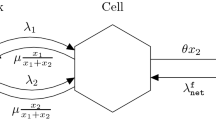Abstract
Motivated by scheduling in cellular wireless networks and resource allocation in computer systems, we study a service facility with two classes of users having heterogeneous service requirement distributions. The aggregate service capacity is assumed to be largest when both classes are served in parallel, but giving preferential treatment to one of the classes may be advantageous when aiming at minimization of the number of users, or when classes have different economic values, for example.
We set out to determine the allocation policies that minimize the total number of users in the system. For some particular cases we can determine the optimal policy exactly, but in general this is not analytically feasible. We then study the optimal policies in the fluid regime, which prove to be close to optimal in the original stochastic model. These policies can be characterized by either linear or exponential switching curves. We numerically compare our results with existing approximations based on optimization in the heavy-traffic regime. By simulations we show that, in general, our simple computable switching-curve strategies based on the fluid analysis perform well.
Similar content being viewed by others
References
Ata, B., Kumar, S.: Heavy traffic analysis of open processing networks with complete resource pooling: asymptotic optimality of discrete review policies. Ann. Appl. Probab. 15, 331–391 (2005)
Bäuerle, N.: Asymptotic optimality of tracking policies in stochastic networks. Ann. Appl. Probab. 10, 1065–1083 (2000)
Bayati, M., Sharma, M., Squillante, M.S.: Optimal scheduling in a multiserver stochastic network. ACM SIGMETRICS Perform. Eval. Rev. 34, 45–47 (2006)
Bell, S.L., Williams, R.J.: Dynamic scheduling of a system with two parallel servers in heavy traffic with resource pooling: asymptotic optimality of a threshold policy. Ann. Appl. Probab. 11, 608–649 (2001)
Bell, S.L., Williams, R.J.: Dynamic scheduling of a parallel server system in heavy traffic with complete resource pooling: asymptotic optimality of a threshold policy. Electron. J. Probab. 10, 1044–1115 (2005)
Bhardwaj, S., Williams, R.J.: Diffusion approximation for a heavily loaded multi-user wireless communication system with cooperation. Queueing Syst. 62, 345–382 (2009)
Bhardwaj, S., Williams, R.J., Acampora, A.S.: On the performance of a two user MIMO downlink system in heavy traffic. IEEE Trans. Inf. Theory 53, 1851–1859 (2007)
Billingsley, P.: Convergence of Probability Measures. Wiley, New York (1999)
Bonald, T., Proutière, A.: Flow-level stability of utility-based allocations for non-convex rate regions. In: Proc. CISS 2006 Conference on Information Sciences and Systems (Princeton University) (2006)
Borst, S.C., Leskelä, L., Jonckheere, M.: Stability of parallel queueing systems with coupled service rates. Discrete Event Dyn. Syst. 18, 447–472 (2008)
Cesari, L.: Optimization—Theory and Applications. Springer, New York (1983)
Cohen, J.W., Boxma, O.J.: Boundary Value Problems in Queueing System Analysis. North-Holland, Amsterdam (1983)
Dai, J.G.: On positive Harris recurrence of multiclass queueing networks: a unified approach via fluid limit models. Ann. Appl. Probab. 5, 49–77 (1995)
Ethier, S.N., Kurtz, T.G.: Markov Processes: Characterization and Convergence. Wiley, New York (1986)
Fayolle, G., Iasnogorodski, R.: Two coupled processors: the reduction to a Riemann-Hilbert problem. Z. Wahr. Verw. Geb. 47, 325–351 (1979)
Gajrat, A., Hordijk, A.: Fluid approximation of a controlled multiclass tandem network. Queueing Syst. 35, 349–380 (2000)
Gajrat, A., Hordijk, A., Ridder, A.: Large-deviations analysis of the fluid approximation for a controllable tandem queue. Ann. Appl. Probab. 13, 1423–1448 (2003)
Harrison, J.M.: Heavy traffic analysis of a system with parallel servers: asymptotic optimality of discrete-review policies. Ann. Appl. Probab. 8, 822–848 (1998)
Harrison, J.M., López, M.J.: Heavy traffic resource pooling in parallel-server systems. Queueing Syst. 33, 339–368 (1999)
Liu, X., Chong, E., Shroff, N.: A framework for opportunistic scheduling in wireless networks. Comput. Netw. 41, 451–474 (2003)
Liu, J., Proutière, A., Yi, Y., Chiang, M., Poor, H.V.: Flow-level stability of data networks with non-convex and time-varying rate regions. ACM SIGMETRICS Perform. Eval. Rev. 35, 239–250 (2007)
Maglaras, C.: Discrete-review policies for scheduling stochastic networks: trajectory tracking and fluid-scale asymptotic optimality. Ann. Appl. Probab. 10, 897–929 (2000)
Mandelbaum, A., Stolyar, A.L.: Scheduling flexible servers with convex delay costs: Heavy-traffic optimality of the generalized c μ-rule. Oper. Res. 52, 836–855 (2004)
Meyn, S.P.: Stability and optimization of queueing networks and their fluid models. In: Mathematics of Stochastic Manufacturing Systems. Lectures in Applied Mathematics, vol. 33, pp. 175–199. AMS, Providence (1997)
Meyn, S.P.: Control Techniques for Complex Networks. Cambridge University Press, New York (2008)
Osogami, T., Harchol-Balter, M., Scheller-Wolf, A.: Analysis of cycle stealing with switching times and thresholds. Perform. Eval. 61, 347–369 (2005)
Osogami, T., Harchol-Balter, M., Scheller-Wolf, A., Zhang, L.: Exploring threshold-based policies for load sharing. In: Forty-second Annual Allerton Conference on Communication, Control, and Computing, pp. 1012–1021 (2004)
Puterman, M.L.: Markov Decision Processes: Discrete Stochastic Dynamic Programming. Wiley, New York (1994)
Righter, R., Shanthikumar, J.G.: Scheduling multiclass single-server queueing systems to stochastically maximize the number of successful departures. Probab. Eng. Inf. Sci. 3, 323–333 (1989)
Seierstad, A., Sydsæter, K.: Optimal Control Theory with Economic Applications. North-Holland, Amsterdam (1987)
Stolyar, A.L.: MaxWeight scheduling in a generalized switch: state space collapse and workload minimization in heavy traffic. Ann. Appl. Probab. 14, 1–53 (2004)
Squillante, M.S., Xia, C.H., Yao, D.D., Zhang, L.: Threshold-based priority policies for parallel-server systems with affinity scheduling. In: Proc. of the IEEE American Control Conference, vol. 4, pp. 2992–2999 (2001)
Tezcan, T.: Stability analysis of N-model systems under a static priority rule using augmented fluid models. Under submission (2010)
Verloop, I.M., Núñez-Queija, R.: Assessing the efficiency of resource allocations in bandwidth-sharing networks. Perform. Eval. 66, 59–77 (2009)
Verloop, I.M., Borst, S.C., Núñez-Queija, R.: Delay optimization in bandwidth-sharing networks. In: Proc. CISS 2006 Conference on Information Sciences and Systems (Princeton University) (2006)
Author information
Authors and Affiliations
Corresponding author
Rights and permissions
About this article
Cite this article
Verloop, I.M., Núñez-Queija, R. Asymptotically optimal parallel resource assignment with interference. Queueing Syst 65, 43–92 (2010). https://doi.org/10.1007/s11134-010-9171-4
Received:
Revised:
Published:
Issue Date:
DOI: https://doi.org/10.1007/s11134-010-9171-4
Keywords
- Parallel servers
- Resource sharing
- Dynamic control
- Optimal scheduling
- Switching curve
- Fluid control problem
- Fluid limit
- Asymptotic optimality




